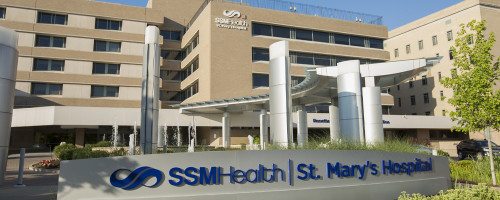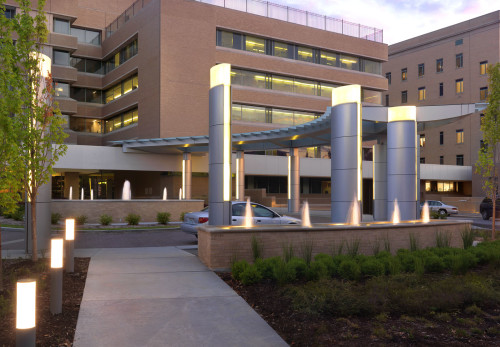






SSM Health St. Mary's Hospital - St. Louis
Treatment Focus
You can admit to this center with a primary substance use disorder or a primary mental health condition. You'll receive support each step of the way and individualized care catered to your unique situation and diagnosis.
Primary Level of Care
Provides 24/7 medical supervision and intensive treatment in a clinical setting for individuals in crisis or with acute needs, focusing on stabilization and immediate safety
This provider hasn't verified their profile's information. Are you the owner of this center? Claim your listing to better manage your presence on Recovery.com.
Treatment Focus
You can admit to this center with a primary substance use disorder or a primary mental health condition. You'll receive support each step of the way and individualized care catered to your unique situation and diagnosis.
Primary Level of Care
Provides 24/7 medical supervision and intensive treatment in a clinical setting for individuals in crisis or with acute needs, focusing on stabilization and immediate safety
Provider's Policy
SSM Health is in-network with most major insurance plans.
SSM Health St. Mary's Hospital - St. Louis
SSM Health St. Mary's Hospital - St. Louis
About SSM Health St. Mary's Hospital - St. Louis
SSM Health's St. Mary's Hospital in St. Louis, set in Richmond Heights, addresses substance use and mental health challenges within the community, including the national opioid crisis. With a range of specialized programs and medically monitored services, SSM Health provides high-quality care tailored to each client's needs.
Access Comprehensive Treatment Options
The program offers a comprehensive range of services for various illnesses, including mental healthcare and addiction treatment. They offer adult, adolescent, and children's intensive outpatient program with group therapy and psychiatric services, as well as outpatient group therapy. This SSM location has experience treating women with high-risk pregnancies, and they can treat mental health and substance use issues related to pregnancy, including postpartum depression.
Their regular mental health and substance use treatment is available on weekdays from 8 a.m. to 5 p.m. They also provide emergency care Monday through Saturday from 9 a.m. to 7 p.m.
Clients can access care notes during and after treatment by logging into MyChart, their client portal.

Center Overview
Treatment Focus
You can admit to this center with a primary substance use disorder or a primary mental health condition. You'll receive support each step of the way and individualized care catered to your unique situation and diagnosis.
Joint Commission Accredited
The Joint Commission accreditation is a voluntary, objective process that evaluates and accredits healthcare organizations (like treatment centers) based on performance standards designed to improve quality and safety for patients. To be accredited means the treatment center has been found to meet the Commission's standards for quality and safety in patient care.

Supportive Medication for Recovery
Medication-Assisted Treatment (MAT) is an evidence-based approach that pairs FDA-approved medications with counseling to treat addiction. The medications are used to reduce cravings, ease withdrawal symptoms, or block the effects of substances. More about MAT
Methadone
Methadone

Dolophine®, Methadose®
Methadone is a full opioid agonist, meaning it activates opioid receptors in the brain to produce effects like pain relief and euphoria. It is longer acting than many other opioids, making it useful in medication-assisted treatment for opioid use disorder.
It reduces withdrawal symptoms and cravings by occupying opioid receptors without causing intense highs. Because it is a full agonist, it must be used carefully to avoid overdose, but it is highly effective when taken as prescribed within a structured program.
Naltrexone
Naltrexone

Vivitrol®, Revia®
Naltrexone is an opioid antagonist, meaning it blocks opioid receptors in the brain and prevents opioids from producing effects like euphoria or sedation. It is used to treat both opioid and alcohol use disorders, but does not cause physical dependence or withdrawal.
It helps reduce cravings and the rewarding effects of opioids or alcohol, supporting long-term recovery. Because it blocks opioid effects, it should only be started after a person has fully detoxed from opioids to avoid triggering withdrawal.
Buprenorphine
Buprenorphine

Suboxone®, Subutex®, Sublocade®, Zubsolv®
Buprenorphine is a partial opioid agonist used to treat opioid use disorder. It activates opioid receptors to reduce cravings and withdrawal but has a ceiling effect, meaning it produces less euphoria and respiratory depression than full opioids.
Buprenorphine binds tightly to opioid receptors, blocking other opioids from attaching and reducing the risk of misuse. It's often combined with naloxone (as in Suboxone®) to discourage injection misuse and is available in daily or monthly forms.
This center accepts patients receiving MAT prescribed elsewhere for opioid use disorder, but does not provide MAT.
Note: Treatment centers offer different forms of MAT—such as oral tablets, dissolvable films, or monthly injections—and their policies can vary based on state regulations, provider preferences, and insurance coverage. Because of these differences, it's best to contact the center directly to learn what options are available and what might be right for your situation.
Insurance Accepted
Cash Pay Rates
Estimated Cash Pay Rate
Center pricing can vary based on program and length of stay. Contact the center for more information. Recovery.com strives for price transparency so you can make an informed decision.
Levels of Care







Treatment
Specializations
Licensed Primary Mental Health
Some primary care providers offer mental health diagnosis and treatment. This can prevent patients from developing more serious conditions.
Drug Addiction
Drug addiction is the excessive and repetitive use of substances, despite harmful consequences to a person's life, health, and relationships.
Intensive Outpatient Program
In an IOP, patients live at home or a sober living, but attend treatment typically 9-15 hours a week. Most programs include talk therapy, support groups, and other methods.
Who We Treat
Men and Women
Men and women attend treatment for addiction in a co-ed setting, going to therapy groups together to share experiences, struggles, and successes.
Adolescents
Teens receive the treatment they need for mental health disorders and addiction, with the added support of educational and vocational services.
Children
Treatment for children incorporates the psychiatric care they need and education, often led by on-site teachers to keep children on track with school.
Pregnant Women
Addiction and mental health treatment meets the clinical and psychological needs of pregnant women, ensuring they receive optimal care in all areas.
Approaches
Evidence-Based
A combination of scientifically rooted therapies and treatments make up evidence-based care, defined by their measured and proven results.
Individual Treatment
Individual care meets the needs of each patient, using personalized treatment to provide them the most relevant care and greatest chance of success.
Therapies
1-on-1 Counseling
Patient and therapist meet 1-on-1 to work through difficult emotions and behavioral challenges in a personal, private setting.
Family Therapy
Family therapy addresses group dynamics within a family system, with a focus on improving communication and interrupting unhealthy relationship patterns.
Trauma-Specific Therapy
This form of talk therapy addresses any childhood trauma at the root of a patient's current diagnosis.
Nutrition Counseling
Nutritious food helps patients heal from within, setting them up for mental and bodily wellness as they learn about healthy eating.
Life Skills
Teaching life skills like cooking, cleaning, clear communication, and even basic math provides a strong foundation for continued recovery.
Relapse Prevention Counseling
Relapse prevention counselors teach patients to recognize the signs of relapse and reduce their risk.
Medication-Assisted Treatment
Combined with behavioral therapy, prescribed medications can enhance treatment by relieving withdrawal symptoms and focus patients on their recovery.
Conditions We Treat
Post Traumatic Stress Disorder
PTSD is a long-term mental health issue caused by a disturbing event or events. Symptoms include anxiety, dissociation, flashbacks, and intrusive thoughts.
Anxiety
Anxiety is a common mental health condition that can include excessive worry, panic attacks, physical tension, and increased blood pressure.
Depression
Symptoms of depression may include fatigue, a sense of numbness, and loss of interest in activities. This condition can range from mild to severe.
Schizophrenia
Schizophrenia is a serious mental health condition that causes hallucinations, delusions, and disordered thinking.
Obsessive Compulsive Disorder (OCD)
OCD is characterized by intrusive and distressing thoughts that drive repetitive behaviors. This pattern disrupts daily life and relationships.
Stress
Stress is a natural reaction to challenges, and it can even help you adapt. However, chronic stress can cause physical and mental health issues.
Bipolar
This mental health condition is characterized by extreme mood swings between depression, mania, and remission.
Trauma
Some traumatic events are so disturbing that they cause long-term mental health problems. Those ongoing issues can also be referred to as "trauma."
ADHD, ADD
ADHD is a common mental health condition caused by dopamine imbalance. Common symptoms include inattention, hyperactivitiy, and impulsivity.
Substances We Treat
Co-Occurring Disorders
A person with multiple mental health diagnoses, such as addiction and depression, has co-occurring disorders also called dual diagnosis.
Drug Addiction
Drug addiction is the excessive and repetitive use of substances, despite harmful consequences to a person's life, health, and relationships.
Opioids
Opioids produce pain-relief and euphoria, which can lead to addiction. This class of drugs includes prescribed medication and the illegal drug heroin.
Alcohol
Using alcohol as a coping mechanism, or drinking excessively throughout the week, signals an alcohol use disorder.
Languages
Aftercare
Experience
Special Considerations
Smoking and Vaping Policy

We love hearing about your treatment experience
Help individuals and families seeking treatment by sharing your first-hand experience with this treatment provider. Review Guidelines.









